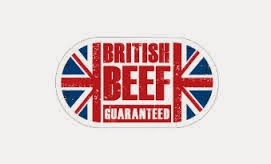“All meat sold in this store,” said the sign, “is British.”
That had me smiling wryly. Because I lived in France for ten years and out there they had signs proclaiming all the meat they were selling to be French. Indeed, during the mad cow disease crisis in Britain, French butchers were strident in their insistence that none of their beef was British.
 |
| A guarantee to make us feel safer Well, unless you're French. Or from anywhere outside Britain |
But food is a visceral matter. I’ve known Jews or Muslims, for instance, who have abandoned every aspect of the practice of their faith who can’t free themselves of their dietary laws: once your body has learned that pork is unclean, it’s hard to shake that feeling. Bear in mind that it is a feeling, far more than a belief. The faith, say that certain rituals must be performed on certain days, is relatively easy to shake because it is a matter for the mind; but the body is far more basic and far more conservative.
So when we feel threatened in our food, we run for atavistic cover: back to what we identify as our community. So British (or French) food is safer because France (or Britain) is our country.
Nationalism is the belief that one country is better than others, simply because it’s ours. And the example of the fatuous posters about locally produced meat underlines how widespread and baseless, that belief is.
It wouldn’t matter if that was as far as it went. But in England today we see the rise of a viciously nationalistic party, UKIP, which wants to further inflame national sentiment and build its popularity on it. So its primary stance is anti-immigrant and, make no mistake about it, their objection to immigrants isn’t truly economic or even political, it’s simply based on the crassest of gut-feel dislike of the foreigner for no other reason than he or she is foreign.
Unsurprisingly, as the two nations are so close, and not just geographically, France is seeing the parallel growth of an equally vicious, xenophobic nationalist party, the Front National, with views that mirror much of UKIP’s stance.
Both parties would, naturally, strongly maintain the superiority of their country’s meat over that of the other – or indeed any other. The people of their nation are better, the foodstuffs of the nation are therefore better.
Sadly, these attitudes are spilling over and infecting far too much of the life of each of these nations. The French FN is whipping up Islamophobia as part of its hatred of anything it sees as extraneous and those attitudes are spreading through an increasing portion of the institutions of society; in Britain, both the Conservatives and, sadly, Labour are trying to woo support among UKIP voters by making dangerous concessions to its views.
It’s no surprise that for all its talk of sympathy with the sufferings of Syria, Britain has let in just 24 refugees from that country.
Nationalism is toxic and it’s deeply anchored. Indeed, there’s only one sentiment capable of supplanting it. Curiously, that’s best exemplified by another matter of nationality of meat.
When the European Union decided to ban beef imports from Britain because of Foot and Mouth, many Northern Irish farmers asked to be reclassified as Irish.
Wonderful, isn’t it? Many of these men are the descendants of Edward Carson who proclaimed “no surrender” to the attempt to push the North into an independent Irish Republic. Many would have voted for Ian Paisley’s party during his “Never, Never, Never” phase. Over their dead bodies would they ever be made to give up their British status and become Irish.
Until, that is, they were hit in their pocket books. Then, yes, being Irish was a legitimate demand and they pursued it energetically.
Come to think of it, that might be the best answer to the threats nationalism poses. Not guns and bullets. Just a little money to persuade its adherents that their bread might be better buttered on the other side. In the long run, it might be a lot more effective.
And, actually, cost a great deal less.
No comments:
Post a Comment